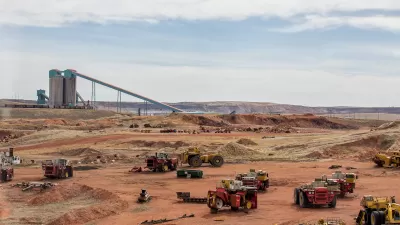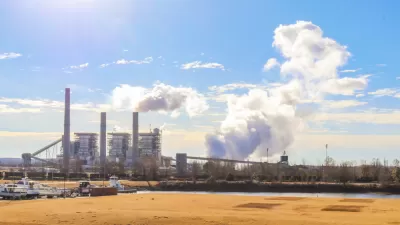Pres. Obama was accused of 'waging a war on coal' - rightly or wrongly, and the fossil fuel industry pumped funds heavily into his opponent's campaign, while environmentalists backed the president. How will this affect federal energy policy?
Juliet Eilperin and Steven Mufson write that "President Obama's reelection, along with key wins by Senate Democrats, ensures that the federal government will press ahead with efforts to promote renewable energy and energy efficiency and to curb greenhouse gas emissions linked to climate change." It is "likely that a second Obama term will deliver some, but not all, of environmentalists' top priorities."
Aside from public energy policy, the energy markets reacted to the president's re-election.
"Investors were quaking already, pummeling shares of coal-mining companies that waged a vigorous advertising battle against Obama's reelection and which are potential casualties of any curbs on greenhouse gas emissions. Shares of Peabody Energy fell 9.6 percent Wednesday, Arch Coal plunged 12.5 percent, Consol Energy dropped 6.1 percent, and Alpha Natural Resources sank 12.2 percent."
"Obama's re-election . . . provides the basis for positive movement on clean tech and climate action once the new Congress meets," the banking giant HSBC's global research group told investors in a research note. But it added, "Silence on climate issues during the campaign until the onset of Hurricane Sandy and continued Republican majority in the House means that scope for strategic action will remain limited."
Environmentalists expect payback.
"What we expect is the president to deliver on climate, roll up his sleeves and build on the modest success of what he's done so far," said Michael Brune, Sierra Club executive director.
However, the pendulum swings both ways for a re-elected President Obama, writes Hearst reporter Jennifer A. Dlouhy.
Obama is now free "to approve natural gas exports and the controversial Keystone XL pipeline without fear of alienating environmentalists he needed at the ballot box."
Thanks to AR SmartBrief
FULL STORY: Obama to continue efforts to curb greenhouse gases, push energy efficiency

Maui's Vacation Rental Debate Turns Ugly
Verbal attacks, misinformation campaigns and fistfights plague a high-stakes debate to convert thousands of vacation rentals into long-term housing.

Planetizen Federal Action Tracker
A weekly monitor of how Trump’s orders and actions are impacting planners and planning in America.

In Urban Planning, AI Prompting Could be the New Design Thinking
Creativity has long been key to great urban design. What if we see AI as our new creative partner?

King County Supportive Housing Program Offers Hope for Unhoused Residents
The county is taking a ‘Housing First’ approach that prioritizes getting people into housing, then offering wraparound supportive services.

Researchers Use AI to Get Clearer Picture of US Housing
Analysts are using artificial intelligence to supercharge their research by allowing them to comb through data faster. Though these AI tools can be error prone, they save time and housing researchers are optimistic about the future.

Making Shared Micromobility More Inclusive
Cities and shared mobility system operators can do more to include people with disabilities in planning and operations, per a new report.
Urban Design for Planners 1: Software Tools
This six-course series explores essential urban design concepts using open source software and equips planners with the tools they need to participate fully in the urban design process.
Planning for Universal Design
Learn the tools for implementing Universal Design in planning regulations.
planning NEXT
Appalachian Highlands Housing Partners
Mpact (founded as Rail~Volution)
City of Camden Redevelopment Agency
City of Astoria
City of Portland
City of Laramie




























